
Self-driving cars have captivated the world. Now, a Brooklyn-based start-up called Voodoo Manufacturing wants to bring the same autonomy and safety to manufacturing, with a factory that makes 3-D prints of any imaginable design, staffed almost entirely by robots.
Customers upload a design file to Voodoo’s site. The start-up then manufactures their desired items in batches from one to 10,000 units per order. Voodoo’s factory runs 160 different 3-D printers today, rather than using injection molding machines you’d find in a conventional factory.
Most recently, Voodoo began developing robots to run the 3-D printers with little to no human oversight, said CEO and co-founder Max Friefeld.
The robots, which Voodoo assembles from available sensors, arms, grippers and other components, can take a plate out of a printer, put a new one in, then restart it to begin the next job.
These tasks used to be done by people.
The company’s proprietary software controls the way the robots work in conjunction with the printers, and keeps orders running on time.
“At a high level, our goal is to automate the machine-tending portion of our factory, and get to 80 percent utilization of all the hardware here,” Friefeld said. “With a really lean team, we could operate around the clock, with maybe one person working the night shift.”
Today, Voodoo offers only two types of plastics, one flexible and one rigid, in 22 colors. But with these two materials, it makes a wide range of swag, and structural parts that go into consumer electronics and other goods. Clients include Nickelodeon, Microsoft, Mattel, Lowe’s and Yoplait, plus a number of hardware start-ups.
Recently, General Catalyst, the Y Combinator Continuity Fund and other investors poured $5 million in new venture funding into Voodoo Manufacturing. (The new round brings their total to $6.4 million raised to date.)
General Catalyst partner Spencer Lazar said he expects the start-up to use the money to convert its Brooklyn factory into one that is operated mostly by robots. Right now, the factory has just one cluster of 3-D printers run by robots.
Asked if this kind of innovation spells bad news for manufacturing jobs growth, the investor said: “Demand for consumer goods is growing fast enough that jobs could still grow. … But the jobs for people will be about software development, or maintenance and monitoring machines, not so much physical labor.”
U.S. manufacturing work has declined steeply since 2007. However, jobs in manufacturing have been growing slightly since 2012, according to data from the Bureau of Labor Statistics. Today, some 12.4 million people hold manufacturing jobs domestically.
[“Source-cnbc”]











